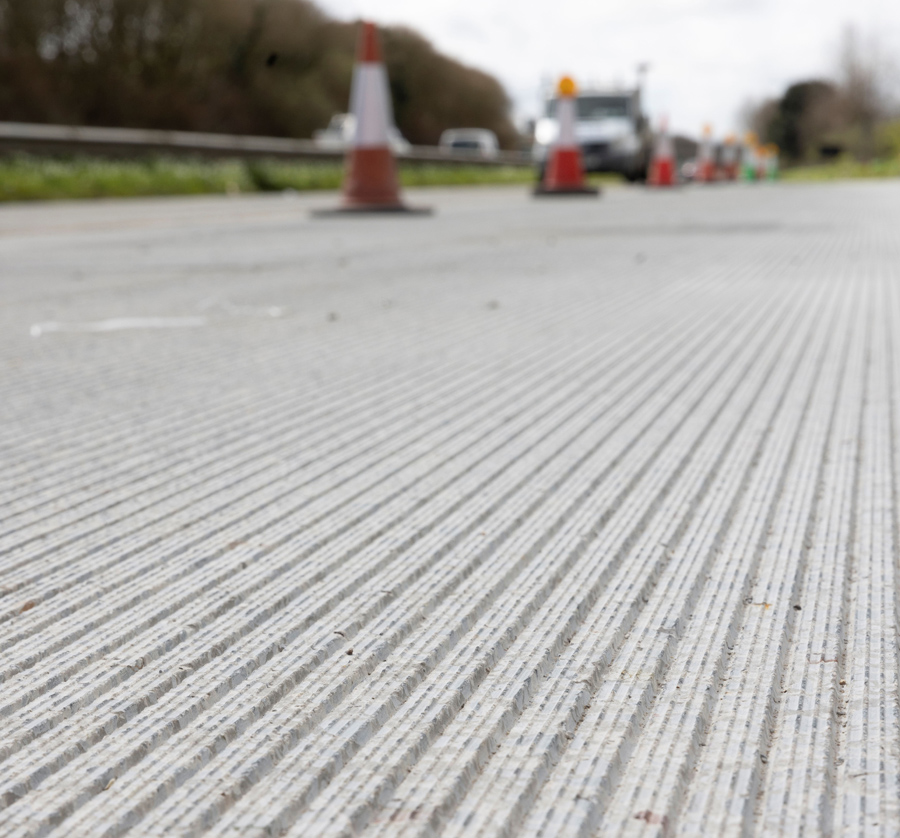A trial of a new concrete refurbishment technique on a section of the A30 in Cornwall has seen noise reduced by up to seven decibels.
The National Highways trial with Tarmac, Wirtgen and Atmo Technology is one of the first in the UK to trial the technique.
In a single-pass process treatment, grooves are created into the existing concrete pavement while grinding is applied onto raised ‘turrets’ on the surface to add texture and improved skid resistance.
Road noise is reduced because of a smaller surface area of contact between vehicle tyres and the surface, with sound further absorbed by the grooves in the pavement.
Around 400 miles (4%) of the strategic road network in the UK is comprised of concrete roads which were typically built in the 1970s and 80s. These roads are typically designed to last up to 40 years before replacement is needed, according to information from National Highways.
Although diamond fine milling has been used on concrete roads for years, each intervention removes around 3mm of material and delivers an expected life of five years.
Tarmac said the new technique can deliver 10-15 years of life before intervention is required, significantly improving the cost benefit, and does not damage joints in the pavement.
Known as Next Generation Concrete Surfacing (NGCS), the technique has been trialled before on the strategic road network, but was previously a two-stage process where longitudinal grinding was followed by grooving.
Tarmac told Highways that its technique, which is part of its Next Generation Concrete Solutions portfolio, differs in that the machinery used can complete the process in a single pass, allowing approximately double the outputs in the same timeframe.
The machine can resurface a width of 1.85 metres, allowing a lane width to be resurfaced in two passes to boost productivity by 150% compared to other approaches.
Nick Angelou, regional contracting director at Tarmac, said: ‘This significant trial has helped to develop a solution for concrete roads which can reduce noise for neighbouring communities as well as extend the lifecycle of the asset to deliver financial and environmental savings by eliminating the need for earlier intervention.’

Nick Knorr, head of National Highways' National Concrete Roads Programme, said: ‘This trial was part of our Concrete Roads Programme which will ultimately replace all of our existing legacy concrete roads.
‘Achieving this goal will take time and significant investment, so it is essential that we find cost effective ways of extending the life of those still in use until they can be replaced.
‘NGCS is a promising technique and we have seen positive results related to noise reduction and ride quality. Ongoing monitoring and future trials will confirm its full impact on asset life extension, but the initial observations are encouraging.’
The trial, which took place in March over a 1.5km section of the eastbound A30 near Penzance saw five surface profiles tested with differing groove dimensions and arrangements.
Atmo Technology developed a mobile sound monitoring device to assess and record noise levels generated by the different surface profiles.
Tarmac said that all five profiles delivered a significant road noise reduction and it will continue to work with National Highways to establish the preferred profile for future projects.
Specialist Belgian paving company Topoff worked with equipment supplier Wirtgen to develop and adapt a machine that can create the grind and groove of the concrete surface in a single pass – the only one of its kind in the world.





